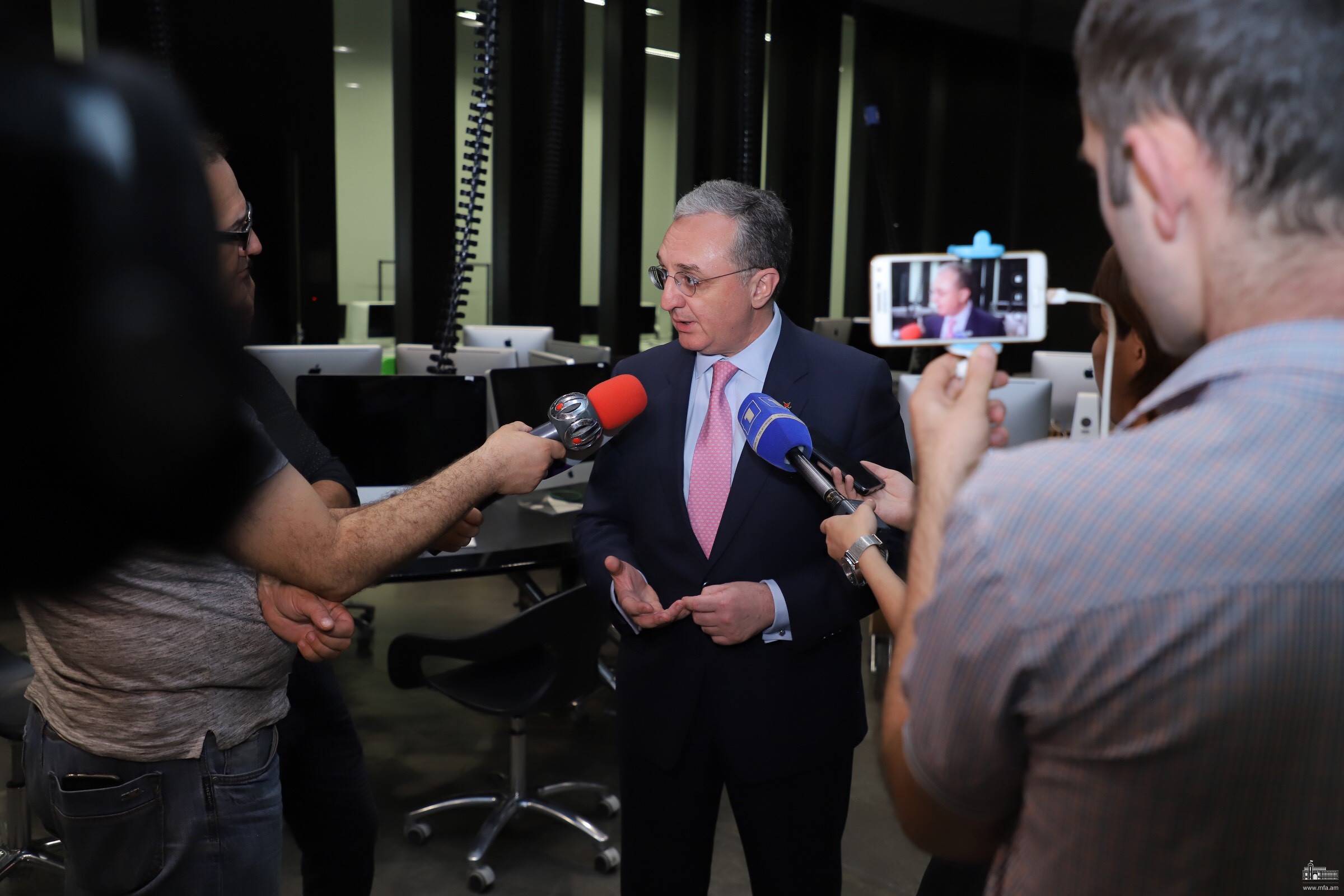Briefing of Foreign Minister Zohrab Mnatsakanyan with journalists on the results of the meeting in business circles
29 August, 2019Question. Mr. Mnatsakanyan, we had a conversation with Mr. Khachatryan, he said that there are issues which need to be addressed in the framework of foreign trade. Which markets do our businessmen mostly, let’s say, “complain” about?
Zohrab Mnatsakanyan․ What my colleague, Mr. Khachatryan says, expresses our joint readiness to create the necessary framework where we can best serve the interests of our business community. That is our approach.
It is difficult for me to immediately answer your question because we, as a state service, as a state institution, an institution which provides services, we have our own capacities: capacity to work via our whole system, being represented abroad through our Embassies; we have the potential to find the right platforms, the right ways to provide the best platforms for building cooperation to direct actors of our development agenda - business representatives.
To which extent we take this role of being the direct linker or creating the platform, this is the key agreement we have with Mr. Khachatryan, the Deputy Prime Ministers and the Prime Minister: we need to make the best use of engaging direct actors in this process. Those actors are business circles.
We need to define the clarity of that order, rudely saying "what do you want" and what's the best use of our resources? And in that sense, which markets are more interesting, which ones are more needed, which areas are more interesting to work with, where do we need to use our resources?
Question. Do you expect clarifications?
Zohrab Mnatsakanyan․ Yes, we do expect that order to be processed. Let me give you another example: we have already gained some experience, in this case with Mr. Hakob Arshakyan, who is responsible for the IT sector. The companies represented in this sector have a very tangible consolidation system, different associations, three associations - the engineering association and the other two. When we are in contact with them, we come together to formulate the answer to the question "what do you want"?
Also, my trip to Ethiopia and Rwanda is a good example, on top of which we want to build on, a good example of using our resources to open doors, gates for our businessmen, and these people, themselves, agreed, joined the process, joined the delegation.
We have designed the program so that we could put these people in direct contact with the heads of relevant government bodies in Ethiopia and Rwanda, with business circles, with the African Union, and with UN agencies in Africa and through this, both the creative education institutions and information technology companies have been able to create a direct agenda that is already practical for them.
And it's a very exciting example that allows us to analyze and build on. The same is true for other areas. Similarly, the agricultural sector, the winemaking sector are also quite good, consolidated sectors. In this respect, we are trying to encourage business associations to use this association mechanism more actively to form an order. If you ask me about problems...
Question. Are you familiar with the key issues business circles face abroad so you can offer your services?
Zohrab Mnatsakanyan․ In this regard, we work with the Ministry of Economy. The Ministry of Economy is in direct contact with business circles or in all areas where they are responsible. The primary, most important function of the Ministry of Foreign Affairs is to provide them with the platform they need based on this resource.
What problems did certain markets have, has also been our function in some particular issues, again in collaboration with our partners in the Ministry of Economy. Of course, for the problems of our business circles, we need help in solving problems. But the issue is still more comprehensive, more coordinated cooperation.
Question. Coordinated between whom?
Zohrab Mnatsakanyan․ Between business circles and us.
Question. Mr. Minister, do our embassies, experts of economic diplomacy come to...?
Zohrab Mnatsakanyan․ This is the most fundamental thing. Our economy is built on the private sector. We rely on private order. We cannot have enough resources ... It is impossible to overestimate what we are doing because our institution is dealing with a multitude of foreign policy issues, in its full scope, from security to all other areas.
Keeping this direct, narrow resource for it - I think we can overestimate the purpose and just not be able to move forward. But in this sense, we have the Ministry of Economy, we have the Ministry of High Technology Industry, we have all the other institutions where we try to provide this government service more clearly, in a more coordinated way through this internal coordination.
Question. Will you suggest any mechanisms?
Zohrab Mnatsakanyan․ We are going to talk about the mechanism we suggest, today, we need to hear each other, and the suggestion, the approach we have, is to what extent the business community is ready to join us, in all ways, to formulate that order and formulate the goals.
To put it more clearly, with a better example, there are instances, a situation, when ambassadors evaluate or reveal a certain business market, a business, a certain project, where maybe it would be possible to sell Armenian products. But in Armenia, there might be no interest for a clear reason: because the direct framework that implements the initiative tends to say “my priorities are different, my priorities are in other region, in other direction.” I’ve brought a very simple example here to manifest that the strengthening of that connection, creating that mechanism, that unified interconnectedness, in the sense of strengthening, shall be done in the practical field. And here we rely on the approaches and direct initiatives, which are implemented in the Ministry of Economy, after which, together we assess how can we deliver the service in a targeted manner.


